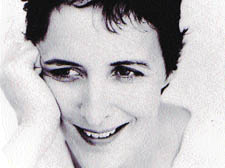|
|
 |
| |

Fiona Shaw |
Fiona’s climb to peak of Booker mountain
Actress Fiona Shaw tells Gerald Isaaman about her experiences as a judge for this year’s Booker prize
SHE paints and takes pleasure in it, she writes essays about her odd experiences and contemplates a book sometime. But it is as an acclaimed actress that Fiona Shaw has dazzled the world.
So she is hesitant about her role as one of the judges of this year’s Booker Prize, the £50,000 icon of success, announced at a sparkling dinner at London’s Guildhall last week.
And the winner was unknown Kiran Desai, 35, with her second novel, The Inheritance of Loss, dedicated to her own novelist mother, Anita Desai, who made the Booker short list three times but never made it to the top.
“To have shared this experience of climbing that mountain of books and finally – and reluctantly – naming the winner is a very heady moment,” Fiona confesses. “But I’m very pleased about it. And very tired.
“It was a very emotional experience. It made me question a lot of things. But I couldn’t have been part of a more focused, honest, serious, and yet very amusing group of people who judged the prize.
“Everyone really gave their hearts to this experience. It was really so remarkable that the day after the world seemed very monochrome, because of the heightenness of being in a room where people were all applying their judgement, their humanity and expertise to the same subject.”
Indeed, she slept late that night at her home in Primrose Hill, before dashing to the Cheltenham Festival of Literature, where her interest in portraiture engaged a different audience with equally rapt attention.
Indeed, she is an intense person who captures so much magic with her lilting Irish tongue that speaks of her upbringing in Cork, where books were always part of a household without a TV set, her mother forever reading Dickens aloud after supper, which made Fiona herself into an obsessive reader.
But she didn’t contemplate reading more than 100 novels for this year’s Booker, worse still nobody warned her of the huge task, the more so when she was appearing in a new play, Woman and Scarecrow by Marina Kerr, at the Royal Court.
“I wept when the boxes of books arrived,” she admits. “I had no idea there would be so many. And I wept because the other judges were wonderfully focused and I found they had read 18 books while I was struggling on number four.”
However, she caught up dramatically by heading for her brother’s apartment in the south of France last July, devoting herself to the big read and having to go by train with the baggage of 40 books because no airline would transport them.
“It was like a 19th century sort of grand tour with all these suitcases filled with books,” she muses.
Still there were problems. “I couldn’t be in one room with lots of books or I panicked,” she reveals. “I had to read one book alone, as if it was the only book in the world, in another room. And that’s how I did it, reading in the morning and the afternoon, or the morning and the evening.”
She had spotted the Desai early on, a novel which took eight years to write about a family divided between India and New York in the mid-’80s, a family saga that, according to one critic, “dissects the dream of empire, old and new, and lays bare the idea of colonial modernity.”
But she was enthralled too by Maria Hyland’s Carry Me Down, and Edward St Aubyn’s Mother’s Milk, realising that there is an in-built unfairness in any prize-system, and personally agonising when the judges “decapitated” the well-known authors who failed to make it to the short-list of six.
“Book seven, book eight or book nine were really enormous books too,” she insists. “And I have a great regret about some of those books that probably were never going to win the Booker but are absolutely lodged in my brain.”
Then she explains: “The last few books have a sort of muscularity so that they insist on being on the short list. So there is hardly a choice. There’s a sort of bruiser gang of books that just cannot be ignored.”
In the end, she decided, when it came to picking a winner from the final two after a meeting last two-and-a-half hours, that Desai’s novel “reaches across oceans to talk to you” and adds: “She manages to make you feel delighted to be a human being.”
She finds herself enriched by having been “in the presence of six absolutely magnificent writers”. She wonders how “the miracle of novelists” can continue re-telling the same truths we all know and also forget.
And she concludes with a theatrical sigh: “When you think of the kind of energy it takes to write a book, my respect for them goes up, and up, and up and up….!” |
 |
 |
|
 |
|


